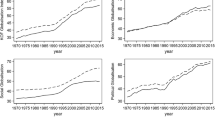Abstract
In this paper, methods of multi-criteria efficiency evaluation are implemented for ranking the socio-economic systems of the EU regions. The socio-economic rank order problem is a multi-criteria non-convex optimization problem that was solved by the implementation of a new efficiency evaluation, AOWI (Absolute Optimal Weights Index). The rank order of the 268 NUTS-2 regions from the 27 European Union countries in the social framework obtained on the basis of 16 socio-economical indicators illustrates social divergence within the European Union and in the new European Union regions.


















Similar content being viewed by others
Notes
Participation of the population aged between 25 and 64 in the measures of general and professional education, which took place in the 4 weeks before the inquiry.
Stages 3–4 (ISCED, 1997).
Stages 5–6 (ISCED, 1997).
The employment rate of the 25–64 age group is the percentage of the general population between 25 and 64 years who are currently employed or are actively seeking employment.
The unemployment rate is the number of unemployed workers divided by the total labor force, which includes all who are willing and able to work for pay—both unemployed and employed in the group of 15 years and older.
References
Afonso A, St. Aubyn M (2005) Cross-country efficiency of secondary education provisions: a semiparametric analysis with non-discretionary inputs. European Central Bank, Working Paper Series 494
Althaler KS, Slavova T (2000) DEA problems under geometrical or probability uncertainties of sample data. Economics Series 89. Institute of Advanced Studies, Vienna
Althaler KS, Dimitrov D, Slavova T (2000) Comparative analysis of the housing promotion. Study on behalf of the Federal Ministry for Economic Affairs. Institute for Advanced Studies (IHS), Vienna
Berrer H, Helmenstein C, Polasek W (2004a) Economic performance of European economies: index construction and sensitivity analysis. 28th Annual conferences of the GfKI, University of Dortmund
Berrer H, Felderer B, Fortin I, Helmenstein C, Kleissner A, Polasek W, Slavova T (2004b) The meaning of (own-) capital markets for dynamic national economies of Europe. A comparative empirical study—final report. Institute for Advanced Studies (IHS), Vienna
Beyko IW, Bodachivsjka LJ, Korobko TW (2005) The problems of multi-criteria estimations with incomplete data with the use of the aggregated Slavova criteria. In: Problems of stochastic and discrete optimization. Ukrainian-Polish Workshop, Kaniv, pp 111–112
Commission of the European Communities (2005) Communication from the Commission on the Social Agenda 33 final. Brussels
Cooper WW, Seiford LM, Tone K (2000) Data envelopment analysis: a comprehensive text with models, applications, references, and DEA-Solver Software. Kluwer Academic Publishers, London
EC (2007) The social situation in the European Union 2005–2006. Overview, Brussels
European Communities (2006) Regions: statistical yearbook 2006. Luxembourg
Felderer B (1997) Social minimum standard in Europe. In: Bauboeck R, Melchior J (eds) Conference report: fundamental rights in the European Union. Series Political Science No. 44, Institute for Advanced Studies (IHS), Vienna
Freudenberg M (2003) Composite indicators of country performance: a critical assessment. STI Working paper 2003/16, OECD, Paris
Grozea-Helmenstein D, Helmenstein C, Slavova T (2006) Benchmarking of location attractiveness of regions. Study on behalf of the OENB Anniversary Fund, IHS, Vienna
Gonand F, Joumard I, Price R (2007) Public spending efficiency: institutional indicators in primary and secondary education, Economic Department. Working Papers No. 543, OECD, Paris
Herrera S, Pang G (2005) Efficiency of public spending in developing countries: an efficiency frontier approach. World Bank Policy Research, Working Paper 3645
Huggins R (2003) Creating a UK competitiveness index: regional and local benchmarking. Reg Stud 9.1:89–96
Human Development Report (2006) Beyond scarcity: power, poverty, and the global water crisis. UNDP. Online in Internet: http://hdr.undp.org/reports/
IMD (2006) World competitiveness yearbook. Lausanne, Switzerland
Kempkes G, Pohl C (2007) The efficiency of German Universities—some evidence from non-parametric and parametric models. CESifo Venice Summer Institute
Kittel B (2002) EMU, EU enlargement, and the European Social Model: trends, challenges, and questions. MPIfG Working Paper 02/1, Max Planck Institute for the Study of Societies, Cologne
Liddle R, Lerais F (2007) Europe’s social reality. Consultation paper from the Bureau of European Policy Advisers, European Commission
Oliveira Martins J, Boarini R, Strauss H, de la Maisonneuve Ch, Saadi C (2007) The policy determinants of investment in tertiary education. OECD Economics Department Working Papers No. 576, OECD Publishing, Paris
Slavova T (2006) The SOW-index for benchmark of European stock-exchanges. In: Proceedings of conference: modern problems of mathematical modelling, forecasting and optimization. Kiew, Kamjanecj-Podiljsjk, pp 70–76
Todd M, Gunnarsson V (2007) Budget rigidity and expenditure efficiency in Slovenia. International Monetary Fund (IMF), Working Paper WP/07/131
Acknowledgments
I would like to thank the participants of the Applied Research Seminar at IHS and two anonymous referees for their valuable and helpful comments as well as the Austrian National Bank for financial support and Prof. Robert Kunst for his attention during the preparation of the manuscript.
Author information
Authors and Affiliations
Corresponding author
Appendix
Appendix
Rights and permissions
About this article
Cite this article
Slavova, T. A rank order and efficiency evaluation of the EU regions in a social framework. Empirica 35, 339–367 (2008). https://doi.org/10.1007/s10663-008-9074-3
Published:
Issue Date:
DOI: https://doi.org/10.1007/s10663-008-9074-3
Keywords
- Regional economics
- Non-parametric benchmarking
- Efficiency evaluation
- Welfare measure
- Index numbers and aggregation




